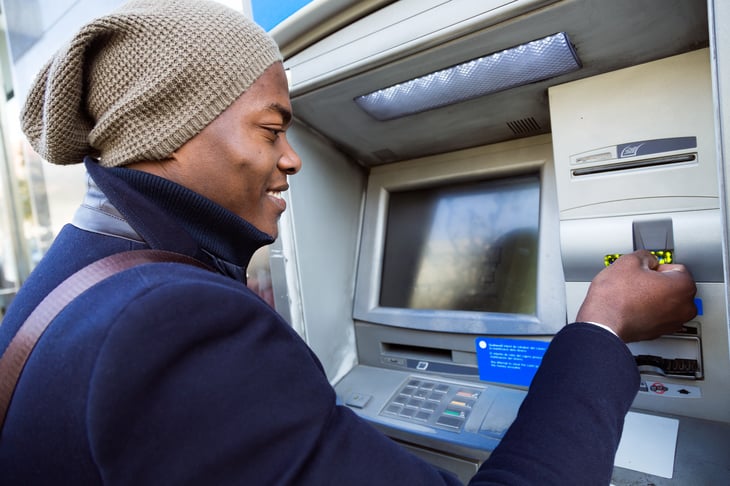
Like it or not, some fees are unavoidable.
But others are excessive, egregious and just plain obnoxious. You certainly don’t have to like them — and you don’t have to pay them either.
Here’s a look at fees you should never need to pay.
1. Coin conversion fee

As paying with cash has become less common, it’s gotten more expensive to turn your change into bills.
Many banks used to have coin-counting machines that account holders could use for free. Now, those that have them generally charge for the service. (However, a coin shortage caused by the pandemic led Regions — and perhaps other banks — to waive those fees temporarily.)
And, of course, many of us don’t physically visit banks anymore — so the only coin counters we encounter are the ones operated by Coinstar in grocery stores.
Coinstar charges a whopping 11.9% service fee plus a 25-cent transaction fee for the pleasure of sitting through all that whirring, clanking and feeding of a few stubborn coins through the machine multiple times.
However, you can avoid this fee in two ways. First, you can redeem your change for an eGift card from a wide variety of retailers and services including Amazon, DoorDash, Home Depot and Southwest Airlines.
Second, you can do the coin sorting yourself. Your bank might still give you coin wrappers for free, or you can find them at the dollar store.
If sorting and rolling coins doesn’t sound worth your time but you still hate the fee, you can strike a middle ground by buying your own coin sorter —
this one’s a bargain for the one-time, flat fee of about $27 on Amazon.
2. ATM fees

Want the privilege of accessing your own money? That’ll be $4.66, please.
That’s the average amount for fees on a transaction through an ATM not run by your bank, according to recent research. It accounts for the fees both the ATM owner and your bank hit you with.
The good news, from the same study, is that banks have been increasingly ditching the practice of charging customers who use out-of-network machines. So keep complaining, and use one of the roughly 40% of banks standing on the right side of history. We name several in “6 Banks That Waive or Refund ATM Fees.”
If you’re not willing to make the switch, you can make liberal use of your debit card to get small amounts of cash back alongside many retail transactions or be sure to always use your own bank’s ATMs.
3. Certain credit card fees

Few industries are more fee-happy than credit cards. Annual fees, late fees, cash advance fees and foreign transaction fees are just a few of the most common.
Many can be avoided with a little diligence. For instance, be sure to compare fees when you choose a credit card — they don’t all charge the same types. (We can help find a credit card that works for you.)
You should also always know how close you are to your credit limit, what your full statement balance is and the due date — that’ll avoid three of the big fees we lay out in “6 Credit Card Costs You Should Never Pay.”
4. Mutual fund sales fees

Mutual fund sales charges, also called load fees, are “like commissions,” according to the Financial Industry Regulatory Authority. You can be charged this type of fee in various situations, depending on the fund:
- When you buy shares (a front-load fee)
- When you sell shares (a back-load fee)
- When you hold onto shares (a level load fee)
They’re a load of something, all right — these fees are a percentage of the amount you invest. That means they’re proportionate to the amount of work you put into making the money, not the amount of work some broker puts into moving it.
One way to get around paying these hefty fees is to invest in no-load funds. Money Talks News founder and former stockbroker Stacy Johnson explains how to do it in “How Do I Invest in a Mutual Fund?”
5. Hotel Wi-Fi fees

Paying to use something many airports, coffee shops and other businesses give you for free seems a little unreasonable, doesn’t it?
Sometimes joining a hotel’s loyalty program provides free in-room Wi-Fi as a perk. You can also bring your own Wi-Fi hotspot — although that might mean you’re just paying a fee to your phone provider instead.
We have more ideas in “11 Tips for Avoiding Ridiculous Hotel Fees.”
6. Bank overdraft fees

Most overdraft fees are paid by people living paycheck to paycheck — the very people who can least afford to pay them. They’re a blight, and thankfully, some banks are doing away with them.
So one way to avoid this kind of fee, also called an insufficient funds fee, is to switch banks.
Another is to tell your bank you’re not interested in paying about $35 every time you don’t have $1 to spare — federal law allows you to opt out of this kind of “protection” from banks. Just be aware that opting out means your card will be declined at the register if you don’t have enough money in your account to cover a charge.
7. Seat selection fees

When we fly somewhere, it’s pretty much a given we’re going to pay for where we park our car, our luggage and our rear. But airlines have also started trying to charge for the privilege of picking whichever remaining corner of the plane you want to cram yourself into when you book a flight.
The way seat selection is presented in the process may make these charges seem inevitable — but there’s generally a link or button somewhere on the page to skip picking a seat and simply let the airline assign one for you.
Another option is to fly on an airline that doesn’t mess around with assigned seating, like Southwest.
Disclosure: The information you read here is always objective. However, we sometimes receive compensation when you click links within our stories.
Techyrack Website stock market day trading and youtube monetization and adsense Approval
Adsense Arbitrage website traffic Get Adsense Approval Google Adsense Earnings Traffic Arbitrage YouTube Monetization YouTube Monetization, Watchtime and Subscribers Ready Monetized Autoblog
from Make Money Online – My Blog https://ift.tt/gs7POjt
via IFTTT
Comments
Post a Comment